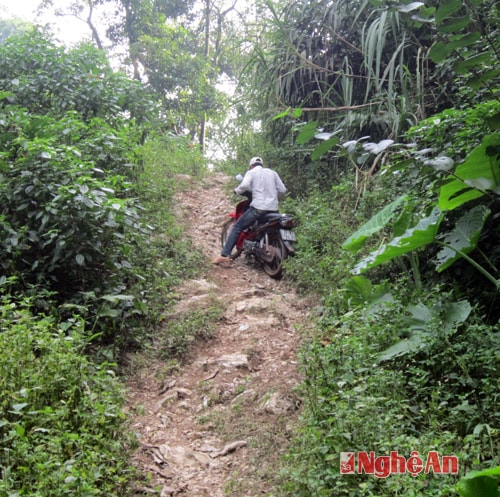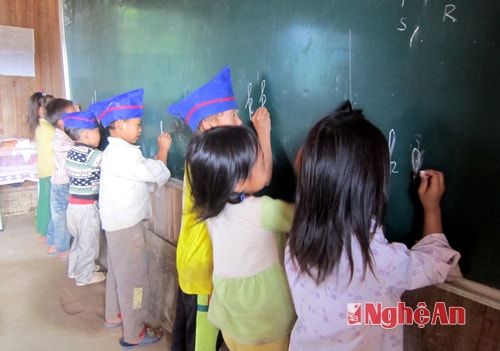Go to Hoi Poc
(Baonghean) - Talking about Huoi Poc - a village in the border commune of Nam Can - Ky Son is talking about remoteness, isolation and hardship. And anyone who has been to Huoi Poc once, surely cannot avoid the lingering feeling...
POVERTY AND MIGRATION
One day after the persistent rain, I decided to go through the forest to Huoi Poc to learn about the life of the Mong people in this remote border area. When they learned about my intention, the soldiers at the Border Guard Station at Nam Can International Border Gate expressed concern. Because the border patrol road after the rainy days had been eroded and slippery, traveling was extremely difficult...
Overcoming the piles of rocks and soil, over slippery and muddy roads, many sections requiring a 4-wheel vehicle as the Mong people say (putting both feet on the road), after about 5 km, Huoi Poc appeared on the other side of the mountain. The low houses, roofed with corrugated iron, were faintly visible in the mist and clouds. Feeling excited, Huoi Poc was not that far, why did everyone keep stopping and warning me? I continued to put my feet on the slippery roads, continued on, kept on going... My legs and arms were tired, at times I felt tired and discouraged. It turned out that although Huoi Poc was close, the road ran along the mountainside, forming almost a complete circle, so it was dozens of times farther.
 |
| Road to Hoi Poc. |
After nearly 3 hours of struggling on the arduous and dangerous road, I finally arrived at Huoi Poc. It was the harvest season for rice, corn and taro, so most of the families were closed, and people were mainly in the fields. Most of the elderly in Huoi Poc did not know the common language, and when asked, they would say "Xi pau! Xi pau!" (don't know). I wandered around for a long time, but couldn't find anyone to ask about the village. Luckily, there was a man in his 40s who went to get taro and could speak the common language. His house was on the top of the mountain, and he had to climb a steep slope. He talked openly and enthusiastically. Through the conversation with the homeowner, I learned that Huoi Poc had 174 households (nearly 1,000 people), all of whom were Mong people. Difficult transportation has "tied" the people here into poverty and backwardness. Their lives are basically self-sufficient, relying on slash-and-burn farming. If a family has surplus rice, corn or other farm products, they cannot sell them at the market, and few people come to the village to buy them. Because the roads are far and isolated, the cost of gas to transport goods to the district market is higher than the cost of the goods, not to mention the difficulty of traveling. There is no electricity grid here, so people have to use mini turbines, which are both weak and unsafe.
Poverty, lack of land for production, difficult transportation, and long-standing customs are the reasons for migration to Laos. In Huoi Poc, since 2012, 12 households have migrated to Laos, some of which have crossed the border illegally. Before migrating, people often sell all their belongings, houses, livestock, and poultry. When they heard that some households in the village were planning to migrate, the commune government and then the district working group came to persuade them. But a few days after the working group withdrew, they secretly sold all their belongings and left...
 |
| First grade students at Huoi Poc school. |
Tired of writing
After lunch, I found my way to Nam Can 2 Primary School. The school is located on the top of a mountain, the road to the school is small, steep and bumpy. The classrooms and the public house are all roofed with dark gray cement, the wooden walls are rotten, the wooden pillars are infested with termites, etc. Most of the classrooms are on the ground. Mr. Nguyen Sy Dong - Principal of Nam Can 2 Primary School, said: "It is located far from the center, cars cannot get there, motorbikes can only go in the dry season, the facilities are still temporary, the educational level of the people is limited, so teaching and learning here is very difficult. Although the majority of the school's teachers are young and love their jobs, always trying hard in teaching, the quality of the school is always at the bottom of the district."
According to the work schedule, that afternoon the school organized labor. The main work was to repair the fence and clean the school grounds. The teachers went into the forest to cut bamboo; the students of grades 4-5 followed the teachers into the forest to transport materials to the school. The students of grades 1-2-3 swept the school yard and cleared the grass in the backyard... Teacher Nguyen Sy Dong said that the infrastructure system, especially the classrooms and teachers' offices, had seriously degraded. The industry leaders and district leaders knew and shared, but could not fix it. Because the road to the village was too difficult, transporting construction materials was almost impossible. For now, teachers and students still had to stick with the degraded classrooms, fixing it themselves to bring letters to the children.
I asked permission to return to Muong Xen, but the teachers insisted on keeping me, because it was already late, and I could not get back to Muong Xen before dark. Tomorrow morning, someone would take me out by a shortcut, saving me more than half the journey, and I would be in time to go to Tay Son to work. Moreover, it had been quite a while, perhaps since the opening day of the new school year, since the school had not had any visitors from afar, and they hoped I would stay to understand more about the lives and thoughts of those who “sow letters” in this remote borderland. So I had a night to spend in Huoi Poc.
The dinner was warm with typical dishes of the highlands. The teachers took turns telling about their memories of their teaching journeys in the highlands and border areas. Everyone told about happy memories, no one talked about the difficulties and hardships. Perhaps, to them, those things had become very normal. Only once, the principal said that each teacher here had a spare notebook and a box of ballpoint pens, so that if any student needed them, they could provide them in time. If any parent remembered, they would pay, if they didn't, the teachers would consider it a help. Or sometimes, the teachers received a few gourds and squashes brought by parents and students.
Huoi Poc is quite cold at night, it seems that winter "knocks on the door" earlier in this borderland. In the morning, Mr. Nguyen Van Cuong was assigned to take me to National Highway 7A by a shortcut. The shortcut from Huoi Poc to Noong De village is nearly 10 km but much more difficult to travel, with steep and steep passes, bumpy and slippery dirt and rock surfaces; and deep streams, without experience in driving, it is easy to have the engine stall. Finally, I reached Noong De, from here, I went down 10 km of steep road to Muong Xen... Huoi Poc was behind me with all the difficulties and obstacles, making me feel restless and worried...
Cong Kien






